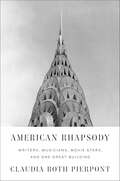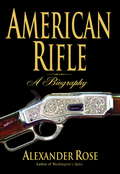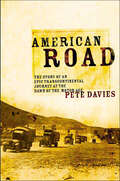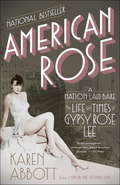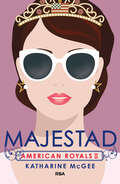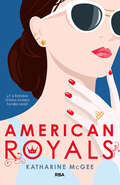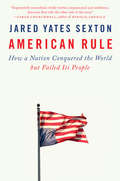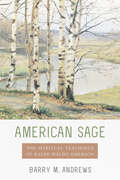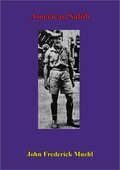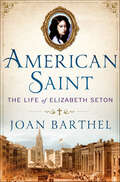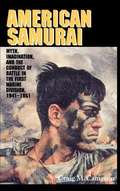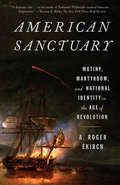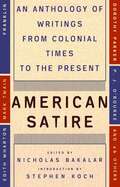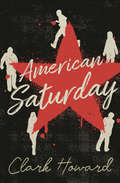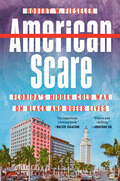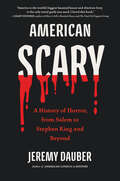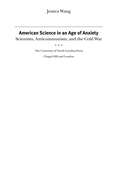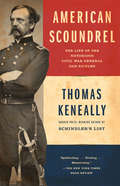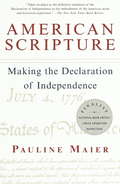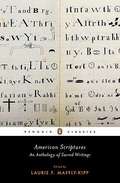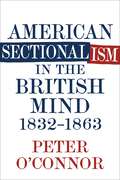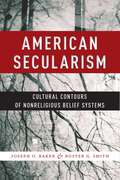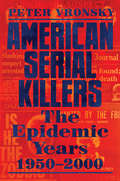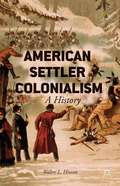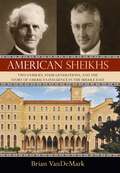- Table View
- List View
American Rhapsody: Writers, Musicians, Movie Stars, and One Great Building
by Claudia Roth PierpontRanging from the shattered gentility of Edith Wharton's heroines to racial confrontation in the songs of Nina Simone, American Rhapsody presents a kaleidoscopic story of the creation of a culture. Here is a series of deeply involving portraits of American artists and innovators who have helped to shape the country in the modern age.Claudia Roth Pierpont expertly mixes biography and criticism, history and reportage, to bring these portraits to life and to link them in surprising ways. It isn't far from Wharton's brave new women to F. Scott Fitzgerald's giddy flappers, and on to the big-screen command of Katharine Hepburn and the dangerous dames of Dashiell Hammett's hard-boiled world. The improvisatory jazziness of George Gershwin's Rhapsody in Blue has its counterpart in the great jazz baby of the New York skyline, the Chrysler Building. Questions of an American acting style are traced from Orson Welles to Marlon Brando, while the new American painting emerges in the gallery of Peggy Guggenheim. And we trace the arc of racial progress from Bert Williams's blackface performances to James Baldwin's warning of the fire next time, however slow and bitter and anguished this progress may be.American Rhapsody offers a history of twentieth-century American invention and genius. It is about the joy and profit of being a heterogeneous people, and the immense difficulty of this human experiment.
American Rifle: A Biography
by Alexander RoseGeorge Washington insisted that his portrait be painted with one. Daniel Boone created a legend with one. Abraham Lincoln shot them on the White House lawn. And Teddy Roosevelt had his specially customized. Now, in this first-of-its-kind book, historian Alexander Rose delivers a colorful, engrossing biography of an American icon: the rifle. Drawing on the words of soldiers, inventors, and presidents, based on extensive new research, and encompassing the Revolution to the present day,American Rifleis a balanced, wonderfully entertaining history of this most essential firearm and its place in American culture. In the eighteenth century American soldiers discovered that they no longer had to fight in Europe's time-honored way. With the evolution of the famed "Kentucky" Rifle--a weapon slow to load but devastatingly accurate in the hands of a master--a new era of warfare dawned, heralding the birth of the American individualist in battle. In this spirited narrative, Alexander Rose reveals the hidden connections between the rifle's development and our nation's history. We witness the high-stakes international competition to produce the most potent gunpowder . . . how the mysterious arts of metallurgy, gunsmithing, and mass production played vital roles in the creation of American economic supremacy . . . and the ways in which bitter infighting between rival arms makers shaped diplomacy and influenced the most momentous decisions in American history. And we learn why advances in rifle technology and ammunition triggered revolutions in military tactics, how ballistics tests--frequently bizarre--were secretly conducted, and which firearms determined the course of entire wars. From physics to geopolitics, from frontiersmen to the birth of the National Rifle Association, from the battles of the Revolution to the war in Iraq,American Rifleis a must read for history buffs, gun collectors, soldiers--and anyone who seeks to understand the dynamic relationship between the rifle and this nation's history.
American Road: The Story of an Epic Transcontinental Journey at the Dawn of the Motor Age
by Pete DaviesA fascinating account of the greatest road trip in American history.On July 7, 1919, an extraordinary cavalcade of sixty-nine military motor vehicles set off from the White House on an epic journey. Their goal was California, and ahead of them lay 3,250 miles of dirt, mud, rock, and sand. Sixty-two days later they arrived in San Francisco, having averaged just five miles an hour. Known as the First Transcontinental Motor Train, this trip was an adventure, a circus, a public relations coup, and a war game all rolled into one. As road conditions worsened, it also became a daily battle of sweat and labor, of guts and determination. American Road is the story of this incredible journey. Pete Davies takes us from east to west, bringing to life the men on the trip, their trials with uncooperative equipment and weather, and the punishing landscape they encountered. Ironically one of the participants was a young soldier named Dwight Eisenhower, who, four decades later, as President, launched the building of the interstate highway system. Davies also provides a colorful history of transcontinental car travel in this country, including the first cross-country trips and the building of the Lincoln Highway. This richly detailed book offers a slice of Americana, a piece of history unknown to many, and a celebration of our love affair with the road.
American Rose: A Nation Laid Bare: The Life and Times of Gypsy Rose Lee
by Karen AbbottWith the critically acclaimed Sin in the Second City, bestselling author Karen Abbott "pioneered sizzle history" (USA Today). Now she returns with the gripping and expansive story of America's coming-of-age--told through the extraordinary life of Gypsy Rose Lee and the world she survived and conquered. America in the Roaring Twenties. Vaudeville was king. Talking pictures were only a distant flicker. Speakeasies beckoned beyond dimly lit doorways; money flowed fast and free. But then, almost overnight, the Great Depression leveled everything. When the dust settled, Americans were primed for a star who could distract them from grim reality and excite them in new, unexpected ways. Enter Gypsy Rose Lee, a strutting, bawdy, erudite stripper who possessed a preternatural gift for delivering exactly what America needed. With her superb narrative skills and eye for compelling detail, Karen Abbott brings to vivid life an era of ambition, glamour, struggle, and survival. Using exclusive interviews and never-before-published material, she vividly delves into Gypsy's world, including her intensely dramatic triangle relationship with her sister, actress June Havoc, and their formidable mother, Rose, a petite but ferocious woman who seduced men and women alike and literally killed to get her daughters on the stage. American Rose chronicles their story, as well as the story of the four scrappy and savvy showbiz brothers from New York City who would pave the way for Gypsy Rose Lee's brand of burlesque. Modeling their shows after the glitzy, daring reviews staged in the theaters of Paris, the Minsky brothers relied on grit, determination, and a few tricks that fell just outside the law--and they would shape, and ultimately transform, the landscape of American entertainment. With a supporting cast of such Jazz- and Depression-era heavyweights as Lucky Luciano, Harry Houdini, FDR, and Fanny Brice, Karen Abbott weaves a rich narrative of a woman who defied all odds to become a legend--and whose sensational tale of tragedy and triumph embodies the American Dream.From the Hardcover edition.
American Royals 2. Majestad
by Katharine McGeeCuando formas parte de la realeza, todo el país opina sobre cómo debes vestir, cómo debes actuar y a quién deberías amar. Cuando quieres formar parte de la realeza, harás todo para captar esa atención. El poder es embriagador, como el primer amor puede dejarte sin aliento. Desde su nacimiento, la princesa Beatrice lo posee. La princesa Samantha nació con menos. Algunos, como Nina González, se sienten atraídos por él. Otros se abrirán camino para conseguirlo. Sí, estamos pensando en tí, Daphne Deighton. Mientras América intenta acostumbrarse a ver a una mujer en el trono... Beatrice lidia con todo lo que perdió cuando ganó la corona; Samantha está ocupada haciendo honor a su fama de princesa fiestera; Nina intenta evitar el palacio y al príncipe Jefferson a toda costa, y un peligroso secreto amenaza los planes que Daphne ha trazado para dar caza al príncipe Jefferson. CORAZONES ROTOS. TRAICIONES. UNA BODA REAL.
American Royals: ¿Y si Estados Unidos tuviera familia real?
by Katharine McGeeCUANDO AMÉRICA GANÓ LA GUERRA DE LA INDEPENDENCIA, EL PUEBLO LE OFRECIÓ LA CORONA A GEORGE WASHINGTON. SIGLOS MÁS TARDE, SUS DESCENDIENTES SIGUEN OCUPANDO EL TRONO... La princesa Beatrice siempre ha aceptado su deber, pero empieza a acusar la presión a medida que se acerca el día de convertirse en la primera soberana de Estados Unidos. A nadie le importa Samantha, la princesa sustituta, salvo cuando incumple las normas; así que ella tampoco se interesa por nada... De haber nacido una generación antes, Jefferson, el gemelo de Samantha, hubiera sido el primero en la línea sucesoria, pero las nuevas leyes lo relegan al tercer lugar. Casi todo el país adora al príncipe, pero son dos chicas, muy distintas entre sí, quienes compiten por ganarse su corazón. EL PODER. EL DEBER. EL DRAMA. LA CORONA.
American Rule: How a Nation Conquered the World but Failed Its People
by Jared Yates SextonFrom writer and political analyst Jared Yates Sexton comes a journey through the history of the United States, from the nation&’s founding to the twenty-first century, which examines and debunks the American myths we've always told ourselves. In recent years, Americans have faced a deluge of horrifying developments in politics and culture: stolen elections, fascist rallies, families torn apart and locked away. A common refrain erupts at each new atrocity: This isn't who we are. In American Rule, Jared Yates Sexton upends those convenient fictions by laying bare the foundational myths at the heart of our collective American imagination. From the very origins of this nation, Americans in power have abused and subjugated others; enabling that corruption are the many myths of American exceptionalism and steadfast values, which are fed to the public and repeated across generations. Working through each era of American growth and change, Sexton weaves together the origins and perpetuation of these narratives still in the public memory, and the acts we have chosen to forget. Stirring, deeply researched, and disturbingly familiar, American Rule is a call to examine our own misconceptions of what it means, and has always meant, to be an American.
American Sage: The Spiritual Teachings of Ralph Waldo Emerson
by Barry M. Andrews&“Succeeds in making Emerson&’s ideas and recommended spiritual practices accessible. . . . [For] those interested in nineteenth-century American spiritualism.&” —Publishers Weekly Even during his lifetime, Ralph Waldo Emerson was called the Sage of Concord, a fitting title for this leader of the American Transcendentalist movement. Everything that Emerson said and wrote directly addressed the conduct of life, and in his view, spiritual truth and understanding were the essence of religion. Unsurprisingly, he sought to rescue spirituality from decay, eschewing dry preaching and rote rituals. Unitarian minister Barry M. Andrews has spent years studying Emerson, finding wisdom and guidance in his teachings and practices, and witnessing how the spiritual lives of others are enriched when they grasp the many meanings in his work. In American Sage, Andrews explores Emerson's writings, including his journals and letters, and makes them accessible to today's spiritual seekers. Written in everyday language and based on scholarship grounded in historical detail, this enlightening book considers the nineteenth-century religious and intellectual crosscurrents that shaped Emerson's worldview to reveal how his spiritual teachings remain timeless and modern, universal and uniquely American. &“An ideal companion for readers working through Emerson's essays, a reading group on spirituality, and any number of classroom situations.&” —David M. Robinson, author of Emerson and the Conduct of Life: Pragmatism and Ethical Purpose in the Later Work &“In a style that is both scholarly and highly readable, Andrews offers an insightful account of Emerson's teachings. . . . demonstrating how his ideas are relevant to readers of today who are poised between faith and unbelief.&” —Phyllis Cole, author of Mary Moody Emerson and the Origins of Transcendentalism: A Family History
American Sahib
by John MuehlAN AMERICAN MEDIC ATTACHED TO THE BRITISH INDIAN ARMY DURING WORLD WAR TWO RECOUNTS HIS EXPERIENCES.John Muehl saw India as few Americans, few Britons, and few Indians ever have the chance to see it. He was with the American Field Service, attached to the British Indian Army, and wore British uniform. "I could travel the length and breadth of the country, with the blessing of the Raj but without its stigma. I was a 'pukah sahib' in the Poona Club, a tommy in the Lady Lumley Canteen, an American tourist in Gorpuri Bazaar, and simply a friend to Raman and Singh." He mingled with the Sikhs and Gurkhas and other Indians who fought under the British not for love of empire or for hate of Japan but for their board and keep. "Nay British sahib-American sahib," he would say when Indians showed reluctance to talk with him. Admiration for America was great enough-though it turned to suspicion by the end of this war in which America seemed to make common cause with the Raj-so that this phrase usually broke down the barrier. And AMERICAN SAHIB is John Muehl's journal of a year. It is an inside story of appalling poverty, famine, and political ferment among the Indians, and of bungling, brutality, and hypocrisy on the part of the British rulers. Fortunately for the reader, the dark picture is lightened with humor and with a sense of the patient philosophy that sustains India. This young American's first shock came when he learned through personal conversations in exclusive officer's clubs that the Briton in India does not conceive himself as graciously bearing the white man's burden, as the propaganda would have us believe. In private, the Briton admits almost boastfully that India's function is to serve as a source of raw materials for England and a market for her products, and if she is ground down in the process that is her worry...Through John Muehl's eyes and ears, we too can see India and hear its people.
American Saint: The Life of Elizabeth Seton
by Joan Barthel“A fascinating biography” of Elizabeth Seton, who shocked high society by converting to Catholicism—a faith that was illegal in New York when she was born (Booklist).In this riveting biography of the first American saint, Joan Barthel tells the mesmerizing story of a woman whose life encompassed wealth and poverty, passion and sorrow, love and loss. Elizabeth was born into a prominent New York City family in 1774—when Catholicism was illegal and priests in the city were arrested, and sometimes hanged. Her father was the chief health officer for the Port of New York, and she lived down the block from Alexander Hamilton. She danced at George Washington’s sixty-fifth Birthday Ball in cream slippers, monogrammed. When Elizabeth and her husband sailed to Italy in a doomed attempt to cure his tuberculosis, she and her family were quarantined in a damp dungeon. And when, after she was widowed, Elizabeth became a Catholic, she was so scorned that people talked of burning down her house. American Saint is the inspiring story of a brave woman who forged the way for other women who followed and who made a name for herself in a world entirely ruled by men. Founder of the Sisters of Charity, she resisted male clerical control of her religious order—and she also started America’s first Catholic school, laying the foundation of an educational system that would help countless children thrive in a new nation.“Compelling . . . an exquisite story of Seton’s inspiring life. . . . Readers interested in Catholic history and U.S. history should not overlook this important biography.” —Publishers Weekly“Barthel is a fine and insightful observer of this larger-than-life woman who was so far ahead two hundred years ago that we’re still catching up with her.” —Gloria SteinemIncludes a foreword by Maya Angelou
American Samurai: Myth and Imagination in the Conduct of Battle in the First Marine Division 1941-1951
by Craig CameronA study of the cultural myths and imagination concerning the Marine Corps before, during and after World War Two and the influence these had on the war.
American Sanctuary: Mutiny, Martyrdom, and National Identity in the Age of Revolution
by A. Roger EkirchFrom “one of the most wide-ranging and imaginative historians in America today; there is no one else quite like him in the profession” (Gordon S. Wood)—a dazzling and original work of history. A. Roger Ekirch’s American Sanctuary begins in 1797 with the bloodiest mutiny ever suffered by the Royal Navy—on the British frigate HMS Hermione, four thousand miles from England’s shores, off the western coast of Puerto Rico. In the midst of the most storied epoch in British seafaring history, the mutiny struck at the very heart of military authority and at Britain’s hierarchical social order. Revolution was in the air: America had won its War of Independence, the French Revolution was still unfolding, and a ferocious rebellion loomed in Ireland, with countless dissidents already arrested. Most of the Hermione mutineers had scattered throughout the North Atlantic; one of them, Jonathan Robbins, had made his way to American shores, and the British were asking for his extradition. Robbins let it be known that he was an American citizen from Danbury, Connecticut, and that he had been impressed into service by the British. John Adams, the Federalist successor to Washington as president, in one of the most catastrophic blunders of his administration, sanctioned Robbins’s extradition, according to the terms of the Jay Treaty of 1794. Convicted of murder and piracy by a court-martial in Jamaica, Robbins was sentenced by the British to death, hauled up on the fore yardarm of the frigate Acasta, blindfolded with his hands tied behind his back, and hanged. Adams’s miscalculation ignited a political firestorm, only to be fanned by news of Robbins’s execution without his constitutional rights of due process and trial by jury. Thomas Jefferson, then vice president and leader of the emergent Republican Party, said, “No one circumstance since the establishment of our government has affected the popular mind more.” Congressional Republicans tried to censure Adams, and the Federalist majority, in a bitter blow to the president, were unable to muster a vote of confidence condoning Robbins’s surrender. American Sanctuary brilliantly lays out in full detail the story of how the Robbins affair and the presidential campaign of 1800 inflamed the new nation and set in motion a constitutional crisis, resulting in Adams’s defeat and Jefferson’s election as the third president of the United States. Ekirch writes that the aftershocks of Robbins’s martyrdom helped to shape the infant republic’s identity in the way Americans envisioned themselves. We see how the Hermione crisis led directly to the country’s historic decision to grant political asylum to refugees from foreign governments—a major achievement in fulfilling the resonant promise of American independence, as voiced by Tom Paine, to provide “an asylum for mankind
American Satire: An Anthology of Writings from Colonial Times to the Present
by Nicholas BakalarThis entertaining, informative collection covers the best of American satire—from Ben Franklin's cutting satiric attacks to Nathaniel Hawthorne's Celestial Railroad, Calvin Trillin's Old Marrieds, Mark Twain's American Abroad to P.J. O'Rourke's The Innocents Abroad—Updated, a late 20th-century take on Twain's classic piece. "Entertaining and satisfying...An excellent introduction."—Amazon.com.
American Saturday
by Clark HowardA &“vividly written&” account of the bloody 1971 San Quentin riot by the Edgar Award–winning author of Zebra and Six Against the Rock (Kirkus Reviews). American Saturday traces one man&’s path from the slums of Chicago to the California state prison where he embraced radicalism, was charged for the murder of a corrections officer, and eventually, was gunned down during the violent chaos following a failed escape attempt. This chilling account of an infamous prison riot comes from a writer who has been called &“a superlative storyteller&” (Publishers Weekly). &“The Saturday was August 21, 1971 and the headline read &‘George Jackson, 5 Others Slain in San Quentin.&’ Howard&’s account traces the careers of the inmates and guards whose lives converged and ended that day, but focuses on the pivotal figure of Jackson himself, whose botched escape attempt—just before his scheduled trial in the &‘Soledad Brothers&’ murder case—led to a gory riot in which three guards, two other inmates, and Jackson himself were killed. . . . Extensively researched and vividly written.&” —Kirkus Reviews
American Scare: Florida's Hidden Cold War on Black and Queer Lives
by Robert W. FieselerA vital exposé for both our history and our present day, American Scare tells the riveting story of how the Florida government destroyed the lives of Black and queer citizens in the twentieth century. In January 1959, Art Copleston was escorted out of his college accounting class by three police officers. In a motel room, blinds drawn, he sat in front of a state senator and the legal counsel for the Florida Legislative Investigation Committee, nicknamed the &“Johns Committee.&” His crime? Being a suspected homosexual. And the government of Florida would use any tactic at their disposal—legal or not—to get Copleston to admit it. Using a secret trove of primary source documents that have been decoded and de-censored for the first time in history, journalist Robert Fieseler unravels the mystery of what actually happened behind the closed doors of an inquisition that held ordinary citizens ransom to its extraordinary powers. The state of Florida would prefer that this history remain buried. But for nearly a decade, the Florida Legislature founded, funded, and supported the Johns Committee—an organization using the cover of communism to viciously attack members of the NAACP and queer professors and students. Spearheaded by Charley Johns, a multi-term politician in a gerrymandered legislature, the Committee was determined to eliminate any threats to the state's white, conservative regime. Fieseler describes the heartbreaking ramifications for citizens of Florida whose lives were imperiled, profiling marginalized residents with compassion and a determination to bring their devasting experiences to light at last. A propulsive, human-centered drama, with fascinating insight into Florida politics, American Scare is a page-turning reckoning of our racist and homophobic past—and its chilling parallels to today.
American Scary: A History of Horror, from Salem to Stephen King and Beyond
by Jeremy Dauber"America is the world's biggest haunted house and American Scary is the only travel guide you need. I loved this book." —Grady Hendrix, New York Times bestselling author of How to Sell a Haunted House and The Final Girl Support GroupFrom the acclaimed author of American Comics comes a sweeping and entertaining narrative that details the rise and enduring grip of horror in American literature, and, ultimately, culture—from the taut, terrifying stories of Edgar Allan Poe to the grisly, lingering films of Jordan Peele America is held captive by horror stories. They flicker on the screen of a darkened movie theater and are shared around the campfire. They blare out in tabloid true-crime headlines, and in the worried voices of local news anchors. They are consumed, virally, on the phones in our pockets. Like the victims in any slasher movie worth its salt, we can&’t escape the thrall of scary stories. In American Scary, noted cultural historian and Columbia professor Jeremy Dauber takes the reader to the startling origins of horror in the United States. Dauber draws a captivating through line that ties historical influences ranging from the Salem witch trials and enslaved-person narratives directly to the body of work we more closely associate with horror today: the weird tales of H. P. Lovecraft, the lingering fiction of Shirley Jackson, the disquieting films of Alfred Hitchcock, the up-all-night stories of Stephen King, and the gripping critiques of Jordan Peele. With the dexterous weave of insight and style that have made him one of America&’s leading historians of popular culture, Dauber makes the haunting case that horror reveals the true depths of the American mind.
American Science in an Age of Anxiety
by Jessica WangNo professional group in the United States benefited more from World War II than the scientific community. After the atomic bombings of Hiroshima and Nagasaki, scientists enjoyed unprecedented public visibility and political influence as a new elite whose expertise now seemed critical to America's future. But as the United States grew committed to Cold War conflict with the Soviet Union and the ideology of anticommunism came to dominate American politics, scientists faced an increasingly vigorous regimen of security and loyalty clearances as well as the threat of intrusive investigations by the notorious House Committee on Un-American Activities and other government bodies.This book is the first major study of American scientists' encounters with Cold War anticommunism in the decade after World War II. By examining cases of individual scientists subjected to loyalty and security investigations, the organizational response of the scientific community to political attacks, and the relationships between Cold War ideology and postwar science policy, Jessica Wang demonstrates the stifling effects of anticommunist ideology on the politics of science. She exposes the deep divisions over the Cold War within the scientific community and provides a complex story of hard choices, a community in crisis, and roads not taken.
American Scoundrel: The Life of the Notorious Civil War General Dan Sickles
by Thomas KeneallyOn the last Sunday of February 1859, Dan Sickles, a charming young congressman from New York, murdered his good friend Philip Barton Key (son of Francis Scott Key)–who was also his wife’s lover–in Washington’s Lafayette Square. The shooting took place directly across the street from the White House, the home of Sickles’s friend and protector, President James Buchanan. Sickles turned himself in; political friends in New York’s Tammany Hall machinery, including the dynamic criminal lawyer James Brady, quickly gathered around. While his beautiful young wife was banned from public life and shunned by society, Dan Sickles was acquitted. American Scoundrel is the extraordinary story of this powerful mid-nineteenth century politician and inveterate womanizer, whose irresistible charms and rock-solid connections not only allowed him to get away with murder — literally — but also paved the way to a stunning career. Once free to resume his life, Dan Sickles raised a regiment for the Union political elite and went on to become a general in the army, rising to the rank of brigadier general and commanding a flank at the Battle of Gettysburg in a maneuver so controversial it is still argued over by scholars today. After losing a leg in that battle, Sickles fought on and after the war became military governor of South Carolina, and later was named minister to Spain, where he continued astonishingly to conduct his amorous assignations. With great brio and insight — and a delight in bad behavior — Thomas Keneally has brought to light a tale of American history that resonates with uncomfortable truths about our politics, ethics, and morality.
American Scripture: Making the Declaration of Independence
by Pauline MaierPauline Maier shows us the Declaration as both the defining statement of our national identity and the moral standard by which we live as a nation. It is truly "American Scripture," and Maier tells us how it came to be -- from the Declaration's birth in the hard and tortuous struggle by which Americans arrived at Independence to the ways in which, in the nineteenth century, the document itself became sanctified.Maier describes the transformation of the Second Continental Congress into a national government, unlike anything that preceded or followed it, and with more authority than the colonists would ever have conceded to the British Parliament; the great difficulty in making the decision for Independence; the influence of Paine's []Common Sense[], which shifted the terms of debate; and the political maneuvers that allowed Congress to make the momentous decision.In Maier's hands, the Declaration of Independence is brought close to us. She lets us hear the voice of the people as revealed in the other "declarations" of 1776: the local resolutions -- most of which have gone unnoticed over the past two centuries -- that explained, advocated, and justified Independence and undergirded Congress's work. Detective-like, she discloses the origins of key ideas and phrases in the Declaration and unravels the complex story of its drafting and of the group-editing job which angered Thomas Jefferson.Maier also reveals what happened to the Declaration after the signing and celebration: how it was largely forgotten and then revived to buttress political arguments of the nineteenth century; and, most important, how Abraham Lincoln ensured its persistence as a living force in American society. Finally, she shows how by the very act of venerating the Declaration as we do -- by holding it as sacrosanct, akin to holy writ -- we may actually be betraying its purpose and its power.From the Hardcover edition.
American Scriptures
by Laurie F. Maffly-KippA groundbreaking collection of sacred Christian writings of American origin from Mormons, Shakers, Christian Scientists, and others. "Scripture" is any work in which the authors, translators, editors, or discoverers all claim to have received wisdom from a source outside themselves, be it revelation, enlightened philosophy, or ancient archive. For the first time in a single volume, American Scriptures gathers fifteen of these texts from religious movements with origins in the United States. Laurie F. Maffly-Kipp's concise single volume will enlighten not only readers interested in the historical and religious aspects of the scriptural texts, but also those whose interest has been piqued by such bestsellers as Angels and Demons and The Da Vinci Code.
American Sectionalism in the British Mind, 1832-1863
by Peter O'ConnorIn American Sectionalism in the British Mind, 1832–1863, Peter O’Connor uses an innovative interdisciplinary approach to provide a corrective to simplified interpretations of British attitudes towards the United States during the antebellum and early Civil War periods. Exploring the many complexities of transatlantic politics and culture, O’Connor examines developing British ideas about U.S. sectionalism, from the abolition of slavery in the British Empire and the Nullification Crisis in South Carolina to the Civil War.Through a close reading of travelogues, fictional accounts, newspaper reports, and personal papers, O’Connor argues that the British literate population had a longstanding familiarity with U.S. sectionalism and with the complex identities of the North and South. As a consequence of their engagement with published accounts of America produced in the decades leading up to the Civil War, the British populace approached the conflict through these preexisting notions.O’Connor reveals even antislavery commentators tended to criticize slavery in the abstract and to highlight elements of the system that they believed compared favorably to the condition of free blacks in the North. As a result, the British saw slavery in the U.S. in national as opposed to sectional terms, which collapsed the moral division between North and South. O’Connor argues that the British identified three regions within America—the British Cavalier South, the British Puritan New England, and the ethnically heterogeneous New York and Pennsylvania region—and demonstrates how the apparent lack of a national American culture prepared Britons for the idea of disunity within the U.S. He then goes on to highlight how British commentators engaged with American debates over political culture, political policy, and states’ rights. In doing so, he reveals the complexity of the British understanding of American sectionalism in the antebellum era and its consequences for British public opinion during the Civil War.American Sectionalism in the British Mind, 1832–1863 re-conceptualizes our understanding of British engagements with the United States during the mid-nineteenth century, offering a new explanation of how the British understood America in the antebellum and Civil War eras.
American Secularism: Cultural Contours of Nonreligious Belief Systems (Religion and Social Transformation #3)
by Joseph O. Baker Buster G. SmithHonorable Mention, American Sociological Association Section on Religion Distinguished Book AwardA rapidly growing number of Americans are embracing life outside the bounds of organized religion. Although America has long been viewed as a fervently religious Christian nation, survey data shows that more and more Americans are identifying as “not religious.” There are more non-religious Americans than ever before, yet social scientists have not adequately studied or typologized secularities, and the lived reality of secular individuals in America has not been astutely analyzed. American Secularism documents how changes to American society have fueled these shifts in the non-religious landscape and examines the diverse and dynamic world of secular Americans.This volume offers a theoretical framework for understanding secularisms. It explores secular Americans’ thought and practice to understand secularisms as worldviews in their own right, not just as negations of religion. Drawing on empirical data, the authors examine how people live secular lives and make meaning outside of organized religion. Joseph O. Baker and Buster G. Smith link secularities to broader issues of social power and organization, providing an empirical and cultural perspective on the secular landscape. In so doing, they demonstrate that shifts in American secularism are reflective of changes in the political meanings of “religion” in American culture.American Secularism addresses the contemporary lived reality of secular individuals, outlining forms of secular identity and showing their connection to patterns of family formation, sexuality, and politics, providing scholars of religion with a more comprehensive understanding of worldviews that do not include traditional religion. Data Analyses Appendix
American Serial Killers: The Epidemic Years 1950-2000
by Peter VronskyFans of Mindhunter and true crime podcasts will devour these chilling stories of serial killers from the American "Golden Age" (1950-2000). With books like Serial Killers, Female Serial Killers and Sons of Cain, Peter Vronsky has established himself as the foremost expert on the history of serial killers. In this first definitive history of the "Golden Age" of American serial murder, when the number and body count of serial killers exploded, Vronsky tells the stories of the most unusual and prominent serial killings from the 1950s to the early twenty-first century. From Ted Bundy to the Golden State Killer, our fascination with these classic serial killers seems to grow by the day. American Serial Killers gives true crime junkies what they crave, with both perennial favorites (Ed Kemper, Jeffrey Dahmer) and lesser-known cases (Melvin Rees, Harvey Glatman).
American Settler Colonialism
by Walter L. Hixson 2013Over the course of three centuries, American settlers helped to create the richest, most powerful nation in human history, even as they killed and displaced millions. This groundbreaking work shows that American history is defined by settler colonialism, providing a compelling framework through which to understand its rise to global dominance.
American Sheikhs: Two Families, Four Generations, and the Story of America's Influence in the Middle East
by Brian VanDeMarkAmerican Sheikhs is the story of a great institution-the American University of Beirut (AUB)-and the families who created and fostered it for almost 150 years. Author Brian VanDeMark's vivid narrative includes not onlythe colorful history of AUB and many memorable episodes in a family saga, but also larger and more important themes. In the story of the efforts of these two families to build a great school with alternating audacity, arrogance, generosity, paternalism, and vision, the author clearly sees an allegory for the larger history of the United States in the Middle East. Before 1945, AUB's history is largely positive. Despite American nationalism and presumptions of Manifest Destiny, Middle Easterners generally viewed the school as an engine of constructive change and the United States as a benign force in the region. But in the post-World War II era, with the rise of America as a world power, AUB found itself buffeted by the strong winds of nationalist frustration, Zionism and anti-Zionism, and-eventually-Islamic extremism. Middle Easterners became more ambivalent about America's purposes and began to see the university not just as a cradle of learning but also as an agent of undesirable Western interests. This story is full of meaning today. By revealing how and why the Blisses and Dodges both succeeded and failed in their attempts to influence the Middle East, VanDeMark shows how America's outreach to the Middle East can be improved and the vital importance of maintaining good relations between Americans and the Arab world in the new century.
